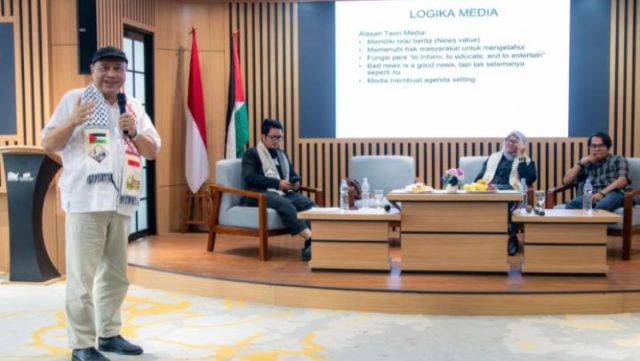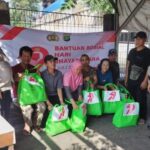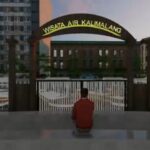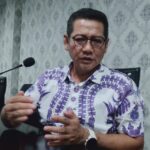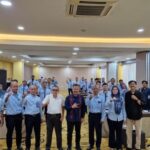Jakarta – The Advisor of the Indonesian Academics Forum appreciated the Aqsa Working Group for once again organizing the Palestine Solidarity Month as a campaign of moral and political resistance against Zionist Israel, which continues to commit humanitarian crimes in Palestine.
“This AWG agenda represents a strengthening of Indonesia’s political and humanitarian support for Palestine, a legacy inherited from national leaders since the era of President Sukarno,” he said in Jakarta regarding the ongoing Palestine Solidarity Month throughout November 2025.
Citing the Chairman of the AWG Presidium, it was further explained that November holds a special place in the long history of the struggle for Palestinian independence.
There are at least five important events that occurred in November: the Balfour Declaration (1917), the death of Yasser Arafat (2004), the Palestinian Declaration of Independence in Algeria (1988), the death of Palestinian figure Izzuddin Al Qassam (1935), and the UN “partition plan” for Palestine (November 29, 1947), which is also designated as Palestine Solidarity Day.
This particular November, the Palestine Solidarity Month carries the theme “Moving together to rebuild Gaza for the liberation of Al-Aqsa and Palestinian independence.” This agenda represents a historical call to continue maintaining and raising awareness about the importance of resistance against the Israeli Zionist occupation of Palestine.
The 2025 Palestine Solidarity Month is part of the global civil society’s defense of Palestine, which is now expressed by various peoples regardless of religion, race, and background.
Throughout November 2025, AWG together with its national networks and partners carried out various activities to raise public awareness about the importance of liberating Al-Aqsa Mosque and Palestinian independence, ranging from education, social actions, to mass mobilization.
Some of the main actions of Palestine Solidarity Month this November include raising Palestinian and Indonesian flags on 23 mountains throughout Indonesia as well as in the Kapuas and Mahakam Rivers, Palestine expo and book discussions at Taman Ismail Marzuki (TIM), Al-Quds Festival, and public lectures and talk shows about Palestine.
Second track diplomacy
In another section, it was stated that AWG has played a role in implementing ‘second track diplomacy’ for the liberation of Al-Aqsa Mosque and Palestinian independence since its establishment 17 years ago, while “first track diplomacy” is fully carried out by the Government.
It was further explained that “first track diplomacy” which only involves the government in carrying out diplomatic missions would not be effective in delivering diplomatic messages to a country, let alone to the international community.
“Therefore, diplomatic activities through ‘second track diplomacy’ that involve public roles are greatly needed to complement traditional diplomatic activities that only involve the Government,” said the former Head of ANTARA New York Bureau 1993-1998 and ANTARA News Director 2016.
According to the senior journalist who is also Director of the Journalist Competency Testing Institute, when viewed from its consistent activities and public diplomacy in defending and seeking the liberation of Al-Aqsa Mosque and Palestinian independence, AWG has effectively carried out the function of ‘second track diplomacy’.
It was mentioned that approximately 80 percent of AWG’s activities involve education and socialization about the importance of understanding the liberation of Al-Aqsa Mosque and the struggle for Palestinian independence in various forums, in addition to mobilizing demonstrations supporting the Palestinian people’s struggle. The remaining approximately 20 percent consists of fundraising activities.
Within the framework of ‘second track diplomacy’, AWG under the auspices of Al-Fatah Islamic Boarding School together with the Medical and Humanitarian Institution Medical Emergency Rescue Committee (MER-C) and Maemuna Center Indonesia initiated the construction of the Indonesian Mother and Child Hospital in Gaza City, Palestine.
AWG itself is an institution established in Jakarta on August 21, 2008, with the purpose of accommodating and managing Muslim efforts to support the liberation of Al-Aqsa Mosque and the Palestinian people’s struggle morally and politically.

